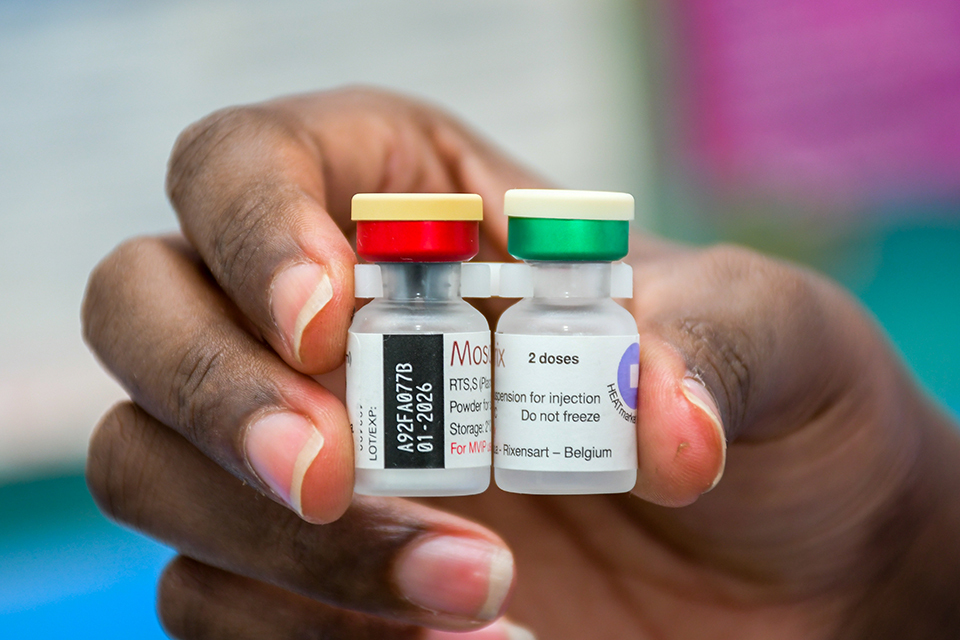
Since 2019, the Malaria Vaccine Implementation Programme (MVIP) has supported nearly 2 million children in Ghana, Kenya and Malawi to receive malaria vaccines through pilot rollouts. The programme has had a substantial impact on reducing severe malaria illness and hospitalizations, and a remarkable reduction in all-cause mortality in children age-eligible to receive the vaccine.
UNICEF is the largest single vaccine buyer in the world, procuring more than 2 billion doses of vaccines annually for routine immunization and outbreak response on behalf of nearly 100 countries. Alongside partners including Gavi, PATH and WHO, UNICEF has been working to create a healthy and sustainable malaria vaccine market by incentivizing suppliers to develop and manufacture vaccines, managing tenders for supply and access to vaccines, establishing demand forecasts that are informed by countries, and delivering doses to reach the most vulnerable children.
The UK Government will improve access to malaria drugs to help tackle one of the biggest killers of children in sub-Saharan Africa, it has announced on Thursday, April 25.
More than 600,000 people worldwide die every year from malaria, which is preventable and treatable. The £7.4 million support for MedAccess will be used to negotiate lower prices for vital malaria drugs and diagnostic tests for people in countries affected by the disease.
The funding brings total UK support to MedAccess to £17.4 million, which will help one million people access new diagnostic tests and 120 million patients to receive anti-malarial treatments.
MedAccess guarantees sales volumes of drugs in markets where demand is uncertain so manufacturers can commit to affordable prices and stable supply. In return, manufacturers receive assurance that they will be paid even if the demand doesn’t materialise.
In three years, it is expected that more than 50 million people will have access to drugs and other items.
The announcement comes on the World Health Organisation’s World Malaria Day, which aims to keep the disease high on the political agenda, mobilize additional resources, and empower communities.
Deputy Foreign Secretary and Minister for Development and Africa, Andrew Mitchell, said, “Thanks to British science, we now have life-saving malaria vaccines which will protect millions of people.
“But we also need to make sure we are making drugs available at the best possible price to the countries that most need them. Deaths from malaria are entirely preventable and the UK’s support for MedAccess will ensure that countries can afford to offer people the best protection against the disease.”
It has also been announced that Sierra Leone, Liberia and Benin will begin their first rollout of the UK-Indian developed RTS,S vaccine, marking a significant milestone in ending malaria.
Collaboration between British scientists and Indian manufacturers resulted in two essential malaria vaccines being developed – RTS,S and R21. These have been used in Ghana, Kenya and Malawi, with two million children vaccinated since 2019, and, in January, Cameroon became the first country to give the vaccines to children routinely.
A total of 22 countries are due to roll out the vaccine. Gavi, which is funded by the UK, is aiming to immunise more than six million children from malaria by the end of 2025.
UK funding helps MedAccess to reduce the costs of a range of innovative health products for HIV, TB and malaria, meaning that UK support for organisations like Gavi and the Global Fund will go further as they benefit from lower prices for products.
Chief Executive Officer for MedAccess, Michael Anderson, said, “We are deeply grateful for FCDO’s continued support, which enables MedAccess to improve access to products for HIV, TB, and malaria in support of Global Fund programmes.
“MedAccess will continue to use innovative financial tools to reduce the cost of diagnosis, prevention and treatment, improving value for money while improving patient access.
“We are glad to announce this renewed funding on World Malaria Day, an important moment for global stakeholders to come together with a common ambition to accelerate malaria prevention and control.”